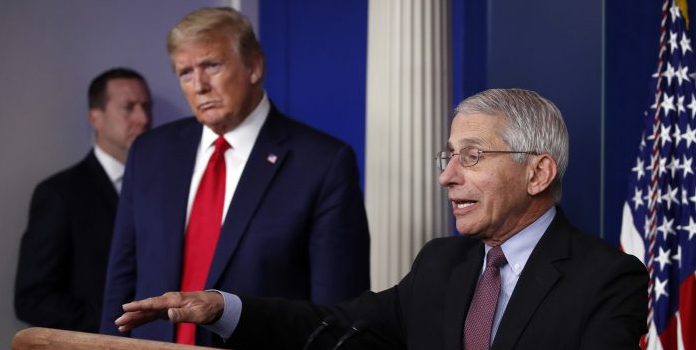The tranche of newly released emails from coronavirus czar Anthony Fauci offered a telling contrast in his priorities during the early days of the coronavirus pandemic.
They revealed that Fauci entertained the possibility of a “tag along” from a top CBS News correspondent while the National Institutes of Health scrambled to roll out a response for when the virus inevitably reached California.
Yet, days later, Fauci indicated that he was too busy to review public communications from a Trump adviser “covering PPE, vaccines, therapeutics, and diagnostics.”
After White House staffers requested the review of an op-ed by Peter Navarro, Trump’s director of trade and manufacturing policy, Fauci finally replied, more than five hours past the requested deadline: “I do not have time for this. Sorry.”
The disconnect might explain what many in the media claimed was a slow response from the Trump administration in February 2020, when the White House’s Coronavirus Task Force already had been formed under the oversight of Health Secretary Alex Azar and, later, Vice President Mike Pence.
Trump downplayed public fears about the virus during much of this time, while striving to reassure Americans that the top experts were already on the case.
He would declare a national emergency in mid-March, shortly after the World Health Organization upgraded COVID’s status to that of a pandemic.
Yet, Fauci seemed more concerned in the weeks prior with what he was going to have for lunch, and whom he would be dining with.
On Feb. 23, CBS News’s chief medical correspondent, Jonathan LaPook, requested to shadow Fauci for a day “to give people an inside look at how seriously the government is taking the outbreak.”
LaPook then sweetened the deal by offering noshes from a well-known New York deli.
“And I could bring down a shmear from Barney Greengrass for lunch,” he wrote. “How could you pass that up???”
Fauci replied: “How about a pastrami sandwich on rye and a potato knish?”
Throughout the Trump administration’s pandemic response, Fauci continued to feud publicly with Navarro, who had forewarned the White House in January 2020 that it should take the COVID threat seriously and restrict Chinese travel.
In his correspondence with LaPook, Fauci seemed to reveal his own indecision and hesitation about crossing the WHO by prematurely referring to the outbreak as a pandemic.
“It will soon be a matter of semantics regarding who would be willing to call it since it is not a mathematically precise definition,” Fauci wrote.
“I am not so sure that WHO will have the will to declare this a ‘pandemic’ before a number of respected epidemiologists around the world start referring publicly to it as a pandemic regardless of what WHO does or does not declare,” he continued. “WHO will likely be behind the curve here and will wait until it is patently obvious what we are dealing with.”
Evidence subsequently revealed that the WHO was likely complicit in China’s efforts to cover up its Wuhan outbreak and intentionally downplay the severity, costing valuable preparation time.
But the e-mails also showed that Fauci was more in the loop than he let on concerning some of the Trump administration’s proposed treatment solutions.
He notoriously second-guessed then-President Donald Trump during a briefing about the benefits of using hydroxychloroquine.
Although Fauci seemed taken aback and insisted that the “anecdotal” claims had yet to be conclusively studied, a month earlier, on Feb. 29, he had been CCed on an email to Pence, in which a pair of Oklahoma physicians extensively discussed their research on the widely available antimalarial drug.
Fauci also responded to a Feb. 24 inquiry that noted that China had been reporting about its clinical studies with the treatment.
“Is there any indication/data to substantiate this claim from China (attached publication) that chloroquine/hydroxychloroquine can decrease COVID-19 infections and lung disease?” wrote Maryland pharmacologist Philip Gatti.
Fauci’s passive reply echoed what he would later convey on the national stage.
“There are no data in this brief report and so I have no way of evaluating their claim,” he wrote dismissively.
“There are a lot of these types of claims going around,” he continued. “I would love to see their data.”
Many of the narratives surrounding the devastating pandemic have now begun to unravel after Fauci acknowledged in a May Senate hearing that he did not know whether China might have been conducting controversial gain-of-function research that led to a leak at the Wuhan Institute of Virology.
Although Fauci denied that US funding had been used on the research, he admitted that grantees—namely EcoHealth Alliance, which was supporting research at the Wuhan lab on the transmission of coronaviruses from bats to humans—might have misled him on its methods.

